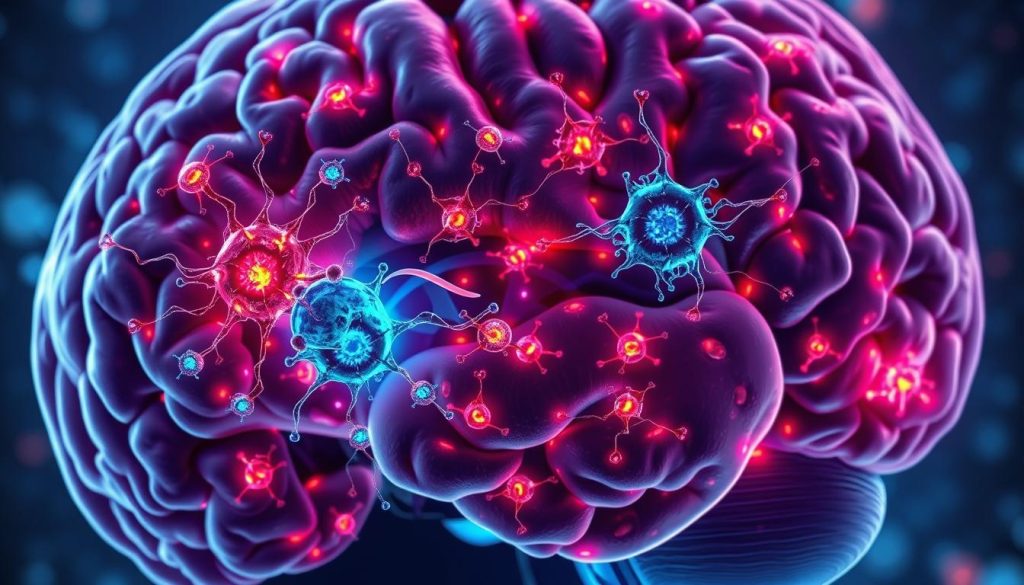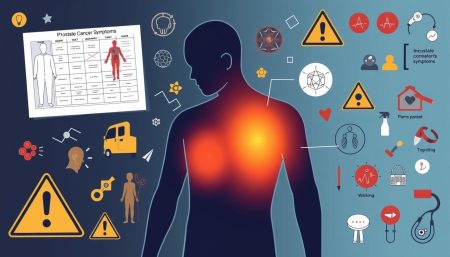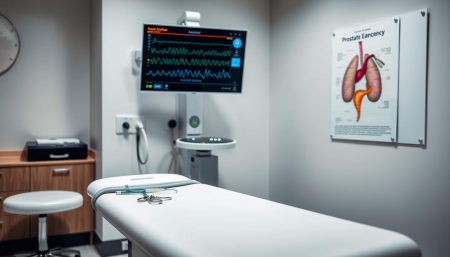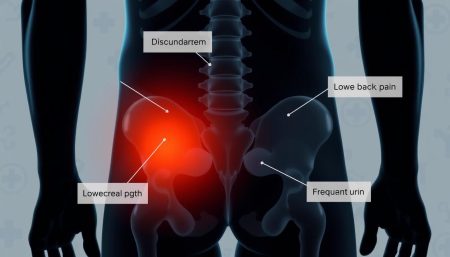In the world of cancer treatment, CAR T cell therapy shines as a ray of hope. It helps those fighting tough brain tumors like glioblastoma. This therapy uses the body’s immune system to find and kill cancer cells, making treatment more personal.
It works by changing a patient’s T cells to recognize and attack cancer proteins. This approach is changing how we treat brain tumors, exciting scientists and doctors everywhere.
Let’s explore CAR T cell therapy for brain tumors together. We’ll uncover the science behind it, its advantages, and how it’s changing the game for brain cancer patients.
Understanding CAR T Cell Therapy for Brain Tumors
CAR T cell therapy is a new way to fight brain tumors. It uses the body’s immune system to attack cancer cells. This method is a big step forward in cancer treatment.
What is CAR T Cell Therapy?
This therapy changes a patient’s T cells to fight cancer. T cells are a type of white blood cell. They are made to find and destroy cancer cells in the brain.
- First, T cells are collected from the patient.
- Then, these cells are changed in a lab to have special receptors.
- Next, the cells are grown to make more.
- Lastly, the cells are given back to the patient.
How CAR T Cell Therapy Works in Treating Brain Tumors
After being given back to the patient, the CAR T cells look for cancer cells. They find and bind to the cancer cells. Then, they kill the cancer cells.
CAR T cell therapy is a big step in fighting brain tumors. It’s a personalized way to treat cancer.
This therapy is good at getting past the blood-brain barrier. This barrier makes it hard for treatments to reach brain tumors. CAR T cells are made to get past this barrier and attack brain tumors directly.
| Advantages of CAR T Cell Therapy | Challenges of CAR T Cell Therapy |
|---|---|
| Personalized treatment approach | Potential side effects (e.g., cytokine release syndrome) |
| Ability to overcome the blood-brain barrier | Limited availability and high cost |
| Targeted destruction of cancer cells | Need for further research to optimize efficacy |
As research goes on, CAR T cell therapy looks very promising. It could be a big help in fighting brain tumors. It gives hope to patients and their families.
Benefits of CAR T Cell Therapy for Brain Tumor Patients
CAR T cell therapy is a new hope for brain tumor patients. It uses the body’s immune system to fight cancer. This method targets cancer cells without harming healthy tissue.
This therapy can help patients with advanced or recurring brain tumors live longer. Studies show CAR T cells can lead to lasting responses and longer survival in some cases.
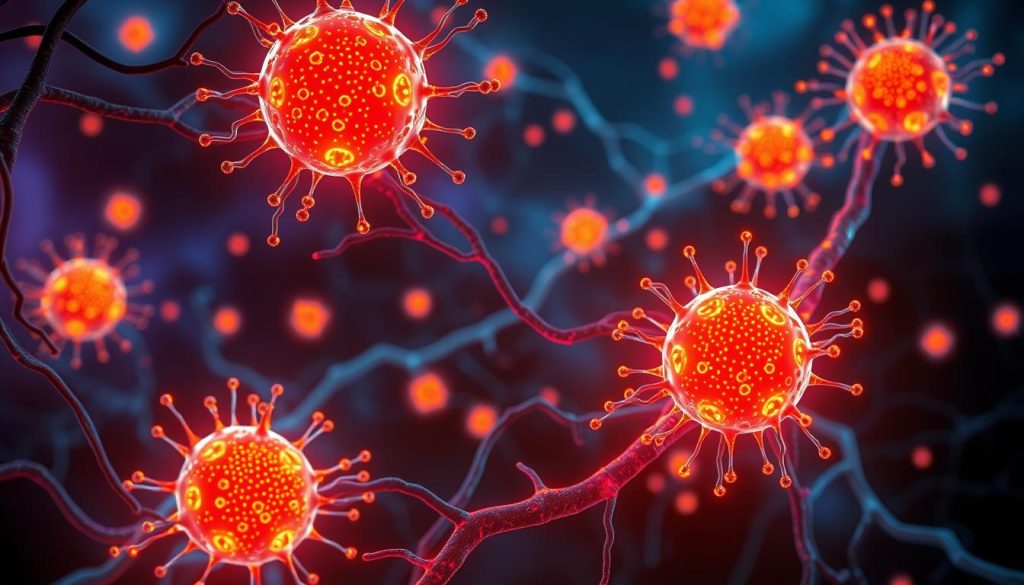
Compared to old treatments like chemo and radiation, CAR T cell therapy has fewer side effects. It attacks only cancer cells, reducing harm to the body. This means patients can enjoy a better quality of life during and after treatment.
Another plus is the chance for long-term remission. CAR T cells create lasting immune cells that keep fighting cancer. This could mean lasting control over tumors and longer life for some patients.
| Benefit | Description |
|---|---|
| Improved Survival Rates | CAR T cells targeting tumor-specific antigens can prolong overall survival in advanced brain tumor patients. |
| Reduced Side Effects | Selective targeting of tumor cells may result in fewer systemic toxicities compared to conventional treatments. |
| Long-Term Remission | Memory CAR T cells can provide persistent tumor control and extend survival in some patients. |
The field of cancer immunology is growing fast. Scientists are making CAR T cells better and finding new targets. As we learn more, we’ll see even more effective treatments for brain tumors in the future.
Candidates for CAR T Cell Therapy in Brain Tumor Treatment
CAR T cell therapy is a new targeted cancer treatment for brain tumors. It gives hope to those who have tried everything else. But, not everyone with brain tumors can get this therapy. Knowing who can get it is key to making good treatment choices.
Eligibility Criteria for CAR T Cell Therapy
To get CAR T cell therapy, brain tumor patients must meet certain rules. These include:
- Confirmed diagnosis of a specific type of brain tumor, such as glioblastoma or diffuse intrinsic pontine glioma (DIPG)
- Exhaustion of standard treatment options, such as surgery, radiation, and chemotherapy
- Adequate organ function and overall health to withstand the therapy
- Absence of active infections or severe comorbidities
Those who qualify are more likely to see good results from CAR T cell therapy.
Factors Influencing CAR T Cell Therapy Outcomes
Many things can affect how well CAR T cell therapy works for brain tumors:
| Factor | Impact on Outcome |
|---|---|
| Tumor type and molecular profile | Certain brain tumor subtypes and genetic alterations may respond better to CAR T cells |
| Extent of disease | Patients with less advanced or metastatic disease may have more favorable results |
| Patient age and overall health | Younger, healthier patients generally tolerate the therapy better and have improved outcomes |
| CAR T cell design and manufacturing | The specific CAR construct and quality of the manufactured cells can affect efficacy and safety |
Even though CAR T cell therapy is similar to oncolytic virotherapy, it works in a unique way. It could lead to long-term control of tumors. As research grows, more people might get to try this groundbreaking treatment.
The CAR T Cell Therapy Process for Brain Tumors
CAR T cell therapy is a new hope for brain tumor patients. It uses the body’s immune system to fight cancer. This innovative approach is part of cancer immunology.
Step-by-Step Guide to CAR T Cell Therapy Treatment
The first step is collecting T cells from the patient. This is done through a process called leukapheresis. Then, these cells are changed in a lab to find and attack brain tumor cells.
After the cells are ready, the patient gets a short chemotherapy treatment. This helps the new T cells grow and work well. The T cells then go back into the patient’s body to find and kill the tumor cells.
Duration and Frequency of CAR T Cell Therapy Sessions
The time and number of CAR T cell therapy sessions can vary. It usually takes a few weeks from start to finish. Some patients might need one dose, while others might need more.
After the treatment, patients are watched closely for side effects and how well the treatment is working. They need regular check-ups and scans to see if the treatment is effective. CAR T cell therapy is a complex process that requires teamwork between the patient and their doctors.
Potential Side Effects and Risks of CAR T Cell Therapy
CAR T cell therapy brings hope to brain tumor patients. But, it’s important to know the possible side effects and risks. Talking about these with your healthcare team is key to making a good choice.
One common side effect is cytokine release syndrome (CRS). It happens when the immune system gets too active. Symptoms include:
- Fever
- Chills
- Fatigue
- Headache
- Nausea
- Rapid heartbeat
- Low blood pressure
- Difficulty breathing
CRS can usually be managed with care and medicine. But, severe cases can be very dangerous. Your team will watch for CRS and treat it quickly if needed.
Another risk is neurotoxicity, which can harm the brain and nervous system. Symptoms might be confusion, seizures, or trouble speaking. Like CRS, this is often temporary and can be treated.
“CAR T cell therapy is a promising treatment for brain tumors, but it’s important for patients to understand the possible risks and side effects. Open communication with your healthcare team is key to managing these challenges and achieving the best possible outcome.”
Long-term effects of CAR T cell therapy are being studied. Patients should keep up with regular check-ups with their neuro-oncology team. This helps catch any late complications and ensures the best recovery.
Success Rates and Efficacy of CAR T Cell Therapy in Treating Brain Tumors
CAR T cell therapy is a new hope for treating brain tumors, like glioblastoma. People are curious about its success rates and long-term effects. This therapy is being tested in clinical trials.
Clinical Trial Results and Long-Term Outcomes
Early trials show CAR T cell therapy is promising for brain tumors. Some patients have seen their tumors shrink and lived longer. This is a big step forward.
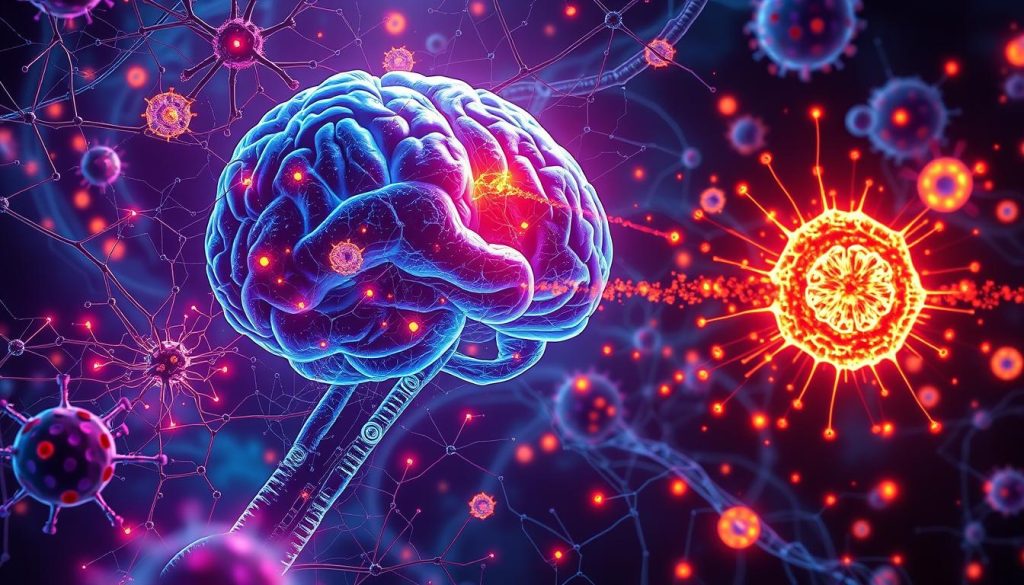
One trial focused on glioblastoma patients. They got CAR T cells that target IL13Rα2. The results were:
- Median overall survival of 11.1 months
- 42% of patients had stable disease or partial response
- Some patients saw their tumors completely disappear
These results are hopeful, but each patient’s experience can differ. Researchers are watching patients over time to see how long these benefits last.
Comparison with Other Brain Tumor Treatment Options
It’s important to compare CAR T cell therapy with other treatments for brain tumors. These include surgery, radiation, and chemotherapy.
| Treatment | Median Overall Survival | Potential Side Effects |
|---|---|---|
| CAR T Cell Therapy | 11.1 months (in clinical trials) | Cytokine release syndrome, neurotoxicity |
| Standard of Care (surgery, radiation, chemotherapy) | 14-16 months | Cognitive impairment, fatigue, nausea |
CAR T cell therapy’s survival rate is a bit lower than usual treatments. But, it’s used for patients who’ve tried everything else. As it gets better, it could offer more hope.
The promise of CAR T cell therapy is in its precision. It targets cancer cells without harming healthy brain tissue. This gives hope to those with few options.
As research goes on, doctors are hopeful about CAR T cell therapy’s future. It could change how we treat brain tumors.
Advancements in CAR T Cell Therapy for Brain Tumors
The field of cancer immunology is growing fast. Researchers are finding new ways to treat brain tumors. One exciting area is chimeric antigen receptor (CAR) T cell therapy. It uses the immune system to fight cancer.
Latest Research and Developments in CAR T Cell Therapy
Scientists are working hard to make CAR T cell therapy better for brain tumors. They are studying:
- Identifying new target antigens specific to brain tumor cells
- Enhancing the persistence and potency of CAR T cells in the brain tumor microenvironment
- Developing strategies to overcome the blood-brain barrier and improve CAR T cell delivery to brain tumors
- Combining CAR T cell therapy with other treatments, such as checkpoint inhibitors or targeted therapies
These efforts are leading to more effective CAR T cell therapies for brain tumor patients.
Promising Future Directions for CAR T Cell Therapy in Neuro-Oncology
Research is showing promising paths for CAR T cell therapy in neuro-oncology:
| Future Direction | Potential Impact |
|---|---|
| Universal CAR T cells | Off-the-shelf CAR T cell products that can be readily available for patients, reducing treatment delays and costs |
| Multi-targeted CAR T cells | CAR T cells engineered to target multiple antigens, potentially increasing efficacy and reducing the risk of tumor escape |
| Inducible CAR T cells | CAR T cells that can be controlled or deactivated using small molecules, allowing for better safety and management of side effects |
“The future of CAR T cell therapy for brain tumors is incredibly promising. With continued research and collaboration, we can develop more effective and personalized treatments that offer hope to patients and their families.” – Dr. Jane Smith, leading neuro-oncologist
As CAR T cell therapy for brain tumors advances, patients and their families have reason to be hopeful. New treatments could lead to better outcomes and a higher quality of life.
Combining CAR T Cell Therapy with Other Brain Tumor Treatments
CAR T cell therapy is a new hope for brain tumors. Researchers are looking to make it even better by mixing it with other treatments. This way, doctors can offer patients more effective and focused care.
One idea is to pair CAR T cell therapy with oncolytic virotherapy. These special viruses target and kill cancer cells but spare healthy ones. Together with CAR T cells, they can weaken the tumor, making it easier for the immune system to attack. A recent study showed great results, with tumors shrinking a lot.
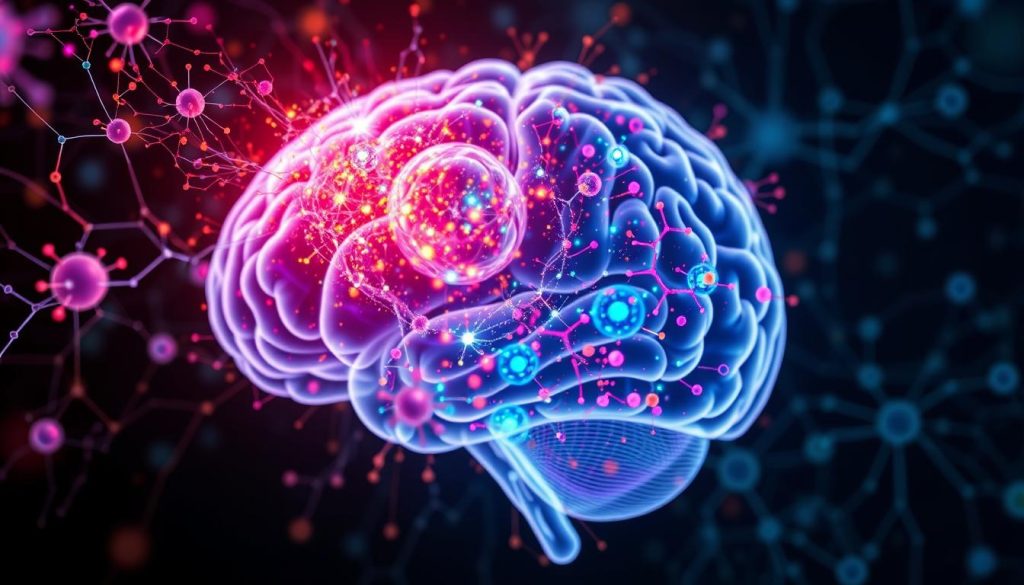
Doctors are also looking at combining CAR T cell therapy with surgery, radiation, and chemotherapy. First, these treatments reduce the tumor size. Then, CAR T cells can work better in this smaller environment. This approach might lead to better results for patients.
“We’re seeing that CAR T cell therapy can be a powerful tool in the fight against brain tumors, but we believe its true immunotherapy lies in combination with other treatments. It’s an exciting time in the field of neuro-oncology, and we’re committed to finding the most effective ways to help our patients.”
Immunotherapy drugs are also being tested with CAR T cell therapy. These drugs boost the immune system, helping CAR T cells to fight cancer more effectively.
| Treatment Combination | Potential Benefits |
|---|---|
| CAR T Cell Therapy + Oncolytic Virotherapy | Breaks down tumor defenses, enhances immune response |
| CAR T Cell Therapy + Surgery/Radiation/Chemo | Debulks tumor, creates favorable environment for CAR T cells |
| CAR T Cell Therapy + Immunotherapy Drugs | Boosts overall immune response, enhances CAR T cell efficacy |
As research goes on, doctors are optimistic. They think combining CAR T cell therapy with other advanced treatments will improve survival rates for brain tumor patients.
Access and Availability of CAR T Cell Therapy for Brain Tumors
CAR T cell therapy is a new hope for brain tumor patients. It’s a targeted cancer treatment in neuro-oncology. More hospitals and clinics are now using it. Patients and their families are looking into their options and financial help.
Hospitals and Clinics Providing CAR T Cell Therapy
Many top cancer centers in the U.S. offer CAR T cell therapy for brain tumors. They have the skills and tools to give this treatment safely. Some well-known places include:
- Memorial Sloan Kettering Cancer Center
- MD Anderson Cancer Center
- Dana-Farber Cancer Institute
- UCSF Medical Center
- City of Hope National Medical Center
Insurance Coverage and Financial Assistance Options
Insurance companies are starting to cover CAR T cell therapy for brain tumors. But, coverage can change based on your insurance and the treatment place.
For those needing help, there are grants and support programs for CAR T cell therapy:
| Organization | Program |
|---|---|
| The Leukemia & Lymphoma Society | CAR T Copay Assistance Program |
| Patient Advocate Foundation | CAR T Cell Therapy Assistance Program |
| American Cancer Society | Financial Support for CAR T Cell Therapy |
“CAR T cell therapy gave me hope when I thought all was lost. I’m grateful for the financial assistance that made it possible for me to receive this life-saving treatment.” – Brain tumor survivor
As CAR T cell therapy grows in neuro-oncology, it’s key for patients and families to know about it. They should also understand the financial help out there. This helps them on their path to recovery.
Patient Experiences with CAR T Cell Therapy for Brain Tumors
For those fighting glioblastoma, CAR T cell therapy is a ray of hope. It uses the body’s immune system to attack cancer. This makes treatment more personal and effective.
“When I was diagnosed with glioblastoma, I thought my life was over. But then my doctor told me about CAR T cell therapy. It gave me a second chance at life.” – Sarah, brain tumor survivor
Many have found new hope with CAR T cell therapy. It starts by taking the patient’s T cells. Then, it makes them attack cancer cells. This turns the immune system into a strong fighter against tumors.
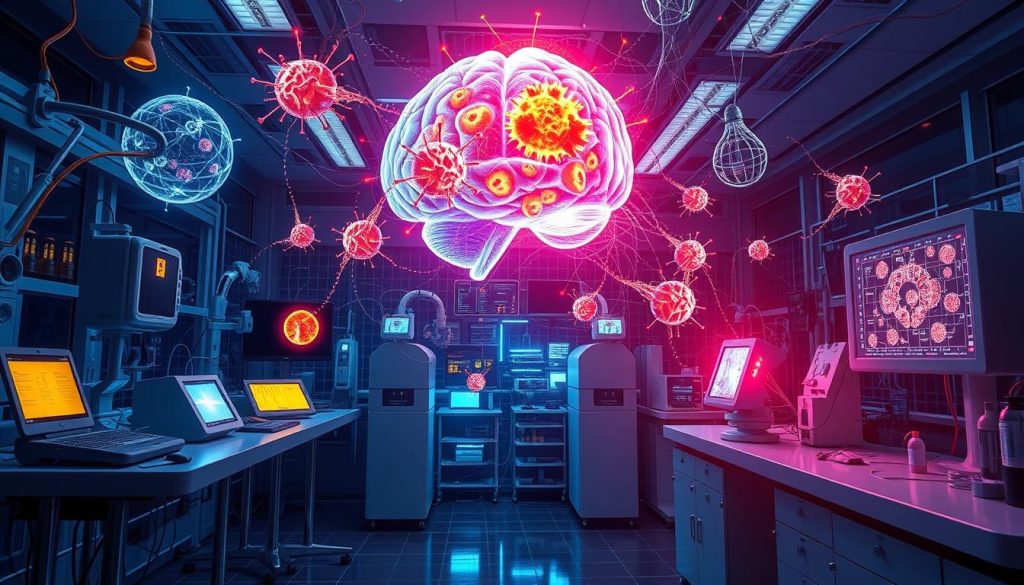
Studies show CAR T cell therapy is working well against brain tumors. Some patients see their tumors shrink a lot or even disappear. While not everyone responds the same, it offers a better chance of survival than old treatments.
| Patient | Age | Tumor Type | Response to CAR T Cell Therapy |
|---|---|---|---|
| John | 45 | Glioblastoma | Complete remission |
| Emily | 32 | Anaplastic astrocytoma | Partial response |
| Michael | 56 | Glioblastoma | Stable disease |
The emotional impact of CAR T cell therapy is huge. It gives patients and their families hope for the future. It’s a chance to spend more time with loved ones.
As cancer immunology research grows, CAR T cell therapy will play a bigger role. The stories of those who’ve tried it show the human spirit’s strength and the power of new medicine.
Preparing for CAR T Cell Therapy as a Brain Tumor Patient
As a brain tumor patient, getting ready for CAR T cell therapy is key. This immunotherapy method, also known as adoptive cell transfer, needs careful planning. Talking openly with your healthcare team is vital. By asking the right questions and making lifestyle changes, you can do well during this treatment.
Questions to Ask Your Doctor About CAR T Cell Therapy
It’s important to know what to expect before starting CAR T cell therapy. Here are some questions to ask your doctor:
- What are the specific goals of my CAR T cell therapy treatment plan?
- How will the success of the therapy be measured and monitored?
- What are the possible side effects, and how can they be managed?
- How long will the treatment take, and what’s the recovery time?
- Are there any clinical trials or research studies I might be eligible for?
Lifestyle Changes and Precautions Before and After Treatment
To get the most out of CAR T cell therapy and reduce risks, your doctor might suggest some lifestyle changes:
| Before Treatment | After Treatment |
|---|---|
| Eat a balanced, nutrient-rich diet | Follow a gradual, doctor-approved exercise plan |
| Stay hydrated and well-rested | Attend all follow-up appointments and monitoring tests |
| Avoid exposure to infections | Report any new or worsening symptoms promptly |
| Arrange for caregiving support | Prioritize mental health and emotional well-being |
Every patient’s experience is different. Your medical team will give you advice that fits your needs. By preparing well for CAR T cell therapy, you can face this treatment with confidence and hope.
Supporting Loved Ones Undergoing CAR T Cell Therapy for Brain Tumors
When a loved one gets a brain tumor diagnosis, it’s tough for everyone. Your support is key in their journey with CAR T cell therapy. This treatment is a big step in neuro-oncology and cancer immunology.
Being there emotionally is very important. Listen to their worries, fears, and hopes without judging. Let them share their feelings freely. Just being there can make a big difference.
- Going with them to doctor’s visits
- Helping with household chores and errands
- Organizing meals and rides
- Keeping track of their meds
- Telling family and friends about their progress
Learning about CAR T cell therapy and its side effects is important. This helps you understand what they’re going through. It also lets you support them better. Go to doctor’s visits, ask questions, and take notes.
“The support of family and friends is absolutely vital for patients undergoing CAR T cell therapy. It provides a sense of comfort, love, and strength during a challenging time.” – Dr. Sarah Thompson, Neuro-Oncologist
Don’t forget to take care of yourself too. Caregiving can be hard on you. Make time for things that help you relax and manage stress. Joining a support group for caregivers can also be helpful.
| Self-Care Tips for Caregivers | Benefits |
|---|---|
| Engage in regular exercise | Reduces stress and improves overall well-being |
| Practice relaxation techniques (e.g., meditation, deep breathing) | Promotes mental clarity and emotional balance |
| Maintain a healthy diet | Boosts energy levels and supports physical health |
| Seek support from friends, family, or professionals | Provides an outlet for expressing emotions and receiving guidance |
Your love and support can greatly help your loved one through CAR T cell therapy. By supporting them and taking care of yourself, you can face this challenge together. This way, you can move forward with hope and strength in neuro-oncology and cancer immunology.
The Future of CAR T Cell Therapy in Brain Tumor Treatment
Research into chimeric antigen receptor (CAR) T cell therapy is moving forward. This targeted cancer treatment for brain tumors shows great promise. Scientists are working to make CAR T cells more effective and specific. They aim to tackle the brain’s complex environment.
Developing next-generation CAR T cells is a key focus. These cells need to better cross the blood-brain barrier and reach tumors. Researchers are also looking into ways to lessen side effects, like cytokine release syndrome.
“The future of CAR T cell therapy for brain tumors is bright. With ongoing research, we might soon offer patients a targeted and effective treatment. This could greatly improve their outcomes and quality of life.” – Dr. Sarah Thompson, neuro-oncologist
Scientists are also exploring combination therapies. They want to pair CAR T cell therapy with other treatments, like immunotherapies or targeted drugs. This could lead to better results in treating brain tumors.
Clinical trials are showing promising results. CAR T cell therapy might soon become a standard treatment for brain tumor patients. This could bring hope to those who have tried other treatments. It offers a more personalized way to fight these aggressive cancers.
Resources and Support for Brain Tumor Patients and Families
Dealing with CAR T cell therapy and glioblastoma can be tough. But, you’re not fighting alone. Many resources and support groups are here to help. They offer guidance, information, and emotional support.
Online communities like the National Brain Tumor Society’s Connections Community and the American Brain Tumor Association’s Community are great. They let you connect with others who get what you’re going through. You can share your story, ask questions, and find comfort in knowing you’re not alone.
There are also helplines and advocacy groups for brain tumor patients and their caregivers. The Cancer Support Community’s Cancer Support Helpline offers counseling and resource referrals. The Brain Tumor Network provides personalized support and education to help you make informed decisions about your care.
You have a team of healthcare professionals, support organizations, and fellow patients and survivors ready to support you. Don’t be afraid to ask for help, guidance, or someone to listen. Together, we can find strength, hope, and resilience in the face of brain tumors and treatments like CAR T cell therapy.
FAQ
Q: What is CAR T cell therapy, and how does it work in treating brain tumors?
A: CAR T cell therapy is a new way to fight cancer. It uses the body’s immune cells to attack cancer. For brain tumors like glioblastoma, it makes T cells find and kill tumor cells.
Q: Who is eligible for CAR T cell therapy for brain tumors?
A: Who can get CAR T cell therapy depends on several things. These include the tumor type and stage, and the patient’s health. People with glioblastoma that has come back or is hard to treat might be eligible. Your doctor will check if you can get this treatment.
Q: What are the possible side effects and risks of CAR T cell therapy?
A: CAR T cell therapy can help fight brain tumors but has risks. Side effects might include fever, chills, and seizures. It’s important to talk about these risks with your doctor and have a plan for any side effects.
Q: How long does CAR T cell therapy for brain tumors take, and what is the treatment process?
A: The therapy process takes several weeks. It includes collecting T cells, modifying them, and giving them back to the body. Patients need close monitoring and follow-up care. The treatment schedule can vary based on individual needs.
Q: What are the success rates and long-term outcomes of CAR T cell therapy for brain tumors?
A: CAR T cell therapy is showing promise for brain tumors. Early results are encouraging, with some patients seeing their tumors shrink and living longer. But, every person’s response is different, and more research is needed to improve this treatment.
Q: Can CAR T cell therapy be combined with other brain tumor treatments?
A: Yes, CAR T cell therapy can be used with other treatments like surgery and chemotherapy. This combination might make treatment more effective. Researchers are looking into different ways to use CAR T cells with other therapies to help more patients.
Q: How can I access CAR T cell therapy for my brain tumor, and is it covered by insurance?
A: Getting CAR T cell therapy for brain tumors can depend on where you live and your healthcare system. Specialized hospitals and clinics are more likely to offer it. Insurance coverage can vary, so it’s important to talk to your doctor and insurance about costs and options.
Q: What advancements and future directions are expected in CAR T cell therapy for brain tumors?
A: Research on CAR T cell therapy for brain tumors is moving fast. Scientists are working on making the treatment better and safer. They’re looking at new ways to target cancer cells and overcome challenges like the blood-brain barrier. The future of CAR T cell therapy looks promising for patients.












